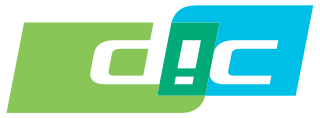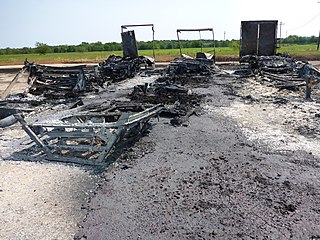
The chemical industry comprises the companies and other organizations that develop and produce industrial, specialty and other chemicals. Central to the modern world economy, it converts raw materials into commodity chemicals for industrial and consumer products. It includes industries for petrochemicals such as polymers for plastics and synthetic fibers; inorganic chemicals such as acids and alkalis; agricultural chemicals such as fertilizers, pesticides and herbicides; and other categories such as industrial gases, speciality chemicals and pharmaceuticals.

Epoxy is the family of basic components or cured end products of epoxy resins. Epoxy resins, also known as polyepoxides, are a class of reactive prepolymers and polymers which contain epoxide groups. The epoxide functional group is also collectively called epoxy. The IUPAC name for an epoxide group is an oxirane.
Bostik is a manufacturer and distributor of adhesives and sealants for the construction, industrial and consumer markets. With annual sales of €2.7 billion, the company employs 7,000 people and has a presence in more than 45 countries. Bostik is part of the French-based Arkema group.
Eastman Chemical Company is an American company primarily involved in the chemical industry. Once a subsidiary of Kodak, today it is an independent global specialty materials company that produces a broad range of advanced materials, chemicals and fibers for everyday purposes. Founded in 1920 and based in Kingsport, Tennessee, the company operates 36 manufacturing sites worldwide and employs approximately 14,000 people.
In organic chemistry, a polyol is an organic compound containing multiple hydroxyl groups. The term "polyol" can have slightly different meanings depending on whether it is used in food science or polymer chemistry. Polyols containing two, three and four hydroxyl groups are diols, triols, and tetrols, respectively.

Rohm and Haas Company is a US manufacturer of specialty chemicals for end use markets such as building and construction, electronic devices, packaging, household and personal care products. Headquartered in Philadelphia, the company is organized into three business groups of Specialty Materials, Performance Materials and Electronic Materials, and also has two stand-alone businesses of Powder Coatings and Salt. Formerly a Fortune 500 Company, Rohm and Haas employs more than 17,000 people in 27 countries, with its last sales revenue reported as an independent company at US$8.9 billion. Dow Chemical Company bought Rohm and Haas for $15 billion in 2009.
Hexion Inc. or Hexion is a chemical company based in Columbus, Ohio. It produces thermoset resins and related technologies and specialty products.
A copolyester is a copolymer synthesized by modification of polyesters, which are combinations of diacids and diols. For example, by introducing other diacids, such as isophthalic acid (IPA), or other diols, such as cyclohexane dimethanol (CHDM) to the polyester polyethylene terephthalate (PET), the material becomes a copolyester due to its comonomer content.

Laporte plc was a leading British chemicals business that operated from 1888 to 2000. It was listed on the London Stock Exchange and was a constituent of the FTSE 100 Index.
Ludwik Leibler, born in 1952 is a Polish-born French physicist. He is Professor of École supérieure de physique et de chimie industrielles de la ville de Paris and member of the French Academy of Sciences and National Academy of Engineering.
Specialty chemicals are particular chemical products which provide a wide variety of effects on which many other industry sectors rely. Some of the categories of speciality chemicals are adhesives, agrichemicals, cleaning materials, colors, cosmetic additives, construction chemicals, elastomers, flavors, food additives, fragrances, industrial gases, lubricants, paints, polymers, surfactants, and textile auxiliaries. Other industrial sectors such as automotive, aerospace, food, cosmetics, agriculture, manufacturing, and textiles are highly dependent on such products.
A. Gary Klesch is an Anglo-American entrepreneur, who in 1990 founded the Klesch Group, a global industrial company, based in Geneva, Switzerland, which he owns and chairs. The Klesch Group of companies has interests in metals, mining, oil and gas, power generation, chemicals and other traditional "heavy" industries. Klesch specializes in principal investing in companies that are operating below their full potential.

Atotech is an international speciality chemicals and equipment company. It provides chemistry and equipment for companies that manufacture printed circuit boards, IC-substrates and semiconductors; and also provides specialty chemicals and equipment for decorative and functional surface finishing in the automotive, construction, furniture and other industries.

DIC Corporation is a Japanese chemical company, specializing in the development, manufacture and sale of inks, pigments, polymers, specialty plastics and compounds and biochemicals.
As of 31 December 2013 Total S.A. had 898 subsidiaries consolidated into the group results, together with significant affiliate investments and joint ventures, mostly in LPG. In addition Total had other significant equity holdings amounting to about 3bn euros, treated as investments and was involved in a number of significant joint ventures, mostly relating to LPG and LNG exploration, production and shipping. The joint ventures that are treated as subsidiaries are listed in the consolidated subsidiary section.

Allnex is a global producer of industrial coating resins and additives for architectural, industrial, protective, automotive and special purpose coatings and inks.

The 2017 Arkema plant explosion was an industrial disaster that took place during Hurricane Harvey in Crosby, Texas. Flooding from the hurricane disabled the refrigeration system at the plant which manufactured organic peroxides. The unrefrigerated organic peroxides decomposed and self-ignited.
Dimethylaminoethyl acrylate or DMAEA is an unsaturated carboxylic acid ester having a tertiary amino group. It is a colorless to yellowish, water-miscible liquid with a pungent, amine-like odor. DMAEA is an important acrylic monomer that gives basic properties to copolymers.
Waterborne resins are sometimes called water-based resins. They are resins or polymeric resins that use water as the carrying medium as opposed to solvent or solvent-less. Resins are used in the production of coatings, adhesives, sealants, elastomers and composite materials. When the phrase waterborne resin is used, it usually describes all resins which have water as the main carrying solvent. The resin could be water-soluble, water reducible or water dispersed.

Röhm GmbH is a German chemicals company headquartered Darmstadt, Germany. Röhm employs around 3,500 employees at 13 sites in Germany, China, USA and South-Africa. In 2021, the company generated revenues of €1.8 billion. Röhm GmbH was founded through the carve-out of the Methacrylates Verbund and CyPlus GmbH from Evonik Industries.










